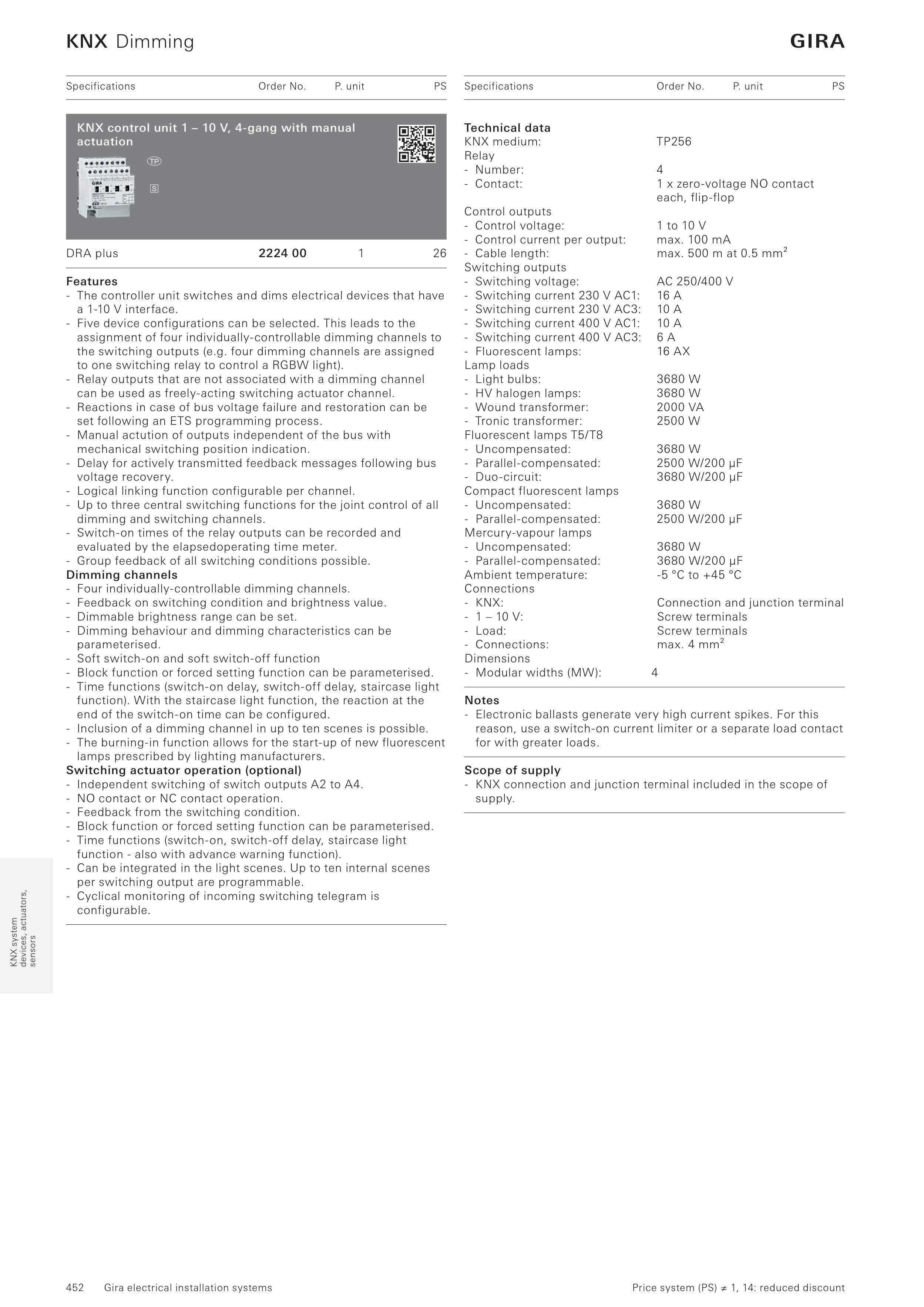452
KNX Dimming
Specifications
Order No.
P. unit
PS
Specifications
Order No.
P. unit
PS
Gira electrical installation systems
Price system (PS) ≠ 1, 14: reduced discount
KNX system
devices, actuators,
sensors
DRA plus
2224002224 00
1
26
Features
- The controller unit switches and dims electrical devices that have
a 1-10 V interface.
- Five device configurations can be selected. This leads to the
assignment of four individually-controllable dimming channels to
the switching outputs (e.g. four dimming channels are assigned
to one switching relay to control a RGBW light).
- Relay outputs that are not associated with a dimming channel
can be used as freely-acting switching actuator channel.
- Reactions in case of bus voltage failure and restoration can be
set following an ETS programming process.
- Manual actution of outputs independent of the bus with
mechanical switching position indication.
- Delay for actively transmitted feedback messages following bus
voltage recovery.
- Logical linking function configurable per channel.
- Up to three central switching functions for the joint control of all
dimming and switching channels.
- Switch-on times of the relay outputs can be recorded and
evaluated by the elapsedoperating time meter.
- Group feedback of all switching conditions possible.
Dimming channels
- Four individually-controllable dimming channels.
- Feedback on switching condition and brightness value.
- Dimmable brightness range can be set.
- Dimming behaviour and dimming characteristics can be
parameterised.
- Soft switch-on and soft switch-off function
- Block function or forced setting function can be parameterised.
- Time functions (switch-on delay, switch-off delay, staircase light
function). With the staircase light function, the reaction at the
end of the switch-on time can be configured.
- Inclusion of a dimming channel in up to ten scenes is possible.
- The burning-in function allows for the start-up of new fluorescent
lamps prescribed by lighting manufacturers.
Switching actuator operation (optional)
- Independent switching of switch outputs A2 to A4.
- NO contact or NC contact operation.
- Feedback from the switching condition.
- Block function or forced setting function can be parameterised.
- Time functions (switch-on, switch-off delay, staircase light
function - also with advance warning function).
- Can be integrated in the light scenes. Up to ten internal scenes
per switching output are programmable.
- Cyclical monitoring of incoming switching telegram is
configurable.
Technical data
KNX medium:
TP256
Relay
- Number:
4
- Contact:
1 x zero-voltage NO contact
each, flip-flop
Control outputs
- Control voltage:
1 to 10 V
- Control current per output:
max. 100 mA
- Cable length:
max. 500 m at 0.5 mm²
Switching outputs
- Switching voltage:
AC 250/400 V
- Switching current 230 V AC1:
16 A
- Switching current 230 V AC3:
10 A
- Switching current 400 V AC1:
10 A
- Switching current 400 V AC3:
6 A
- Fluorescent lamps:
16 AX
Lamp loads
- Light bulbs:
3680 W
- HV halogen lamps:
3680 W
- Wound transformer:
2000 VA
- Tronic transformer:
2500 W
Fluorescent lamps T5/T8
- Uncompensated:
3680 W
- Parallel-compensated:
2500 W/200 µF
- Duo-circuit:
3680 W/200 µF
Compact fluorescent lamps
- Uncompensated:
3680 W
- Parallel-compensated:
2500 W/200 µF
Mercury-vapour lamps
- Uncompensated:
3680 W
- Parallel-compensated:
3680 W/200 µF
Ambient temperature:
-5 °C to +45 °C
Connections
- KNX:
Connection and junction terminal
- 1 – 10 V:
Screw terminals
- Load:
Screw terminals
- Connections:
max. 4 mm²
Dimensions
- Modular widths (MW):
4
Notes
- Electronic ballasts generate very high current spikes. For this
reason, use a switch-on current limiter or a separate load contact
for with greater loads.
Scope of supply
- KNX connection and junction terminal included in the scope of
supply.
KNX control unit 1 – 10 V, 4-gang with manual
actuation


